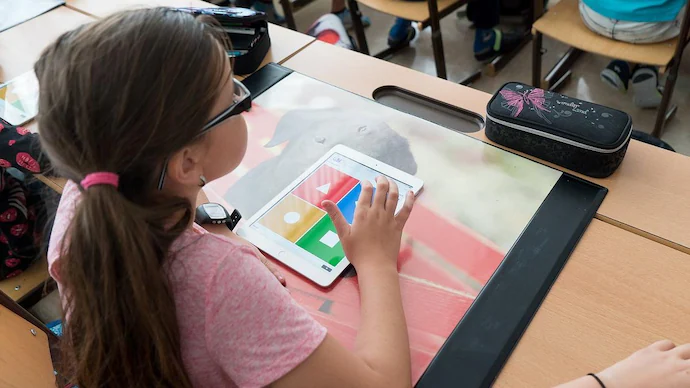- December 9, 2023
- by Educational Initiatives
- Blog
- 0 Comments
This article appeared in India Today on 6 January, 2021
India as a country is developing rapidly in terms of technology, however, over the years the country had a very conventional approach to learning. The main form of learning which was considered credible was the traditional format of classroom sessions and for the longest time, people were skeptical about adopting the online format of learning.
However, since the outbreak of Covid-19, the trends in education have changed dramatically across the globe and in India. Due to school closures to prevent the spread of Covid-19, physical classes have moved to the digital space.
Online learning has been adopted extensively by schools and educational institutions to ensure that there is continuity in learning. The biggest concern with this new education structure is determining if the learning outcomes are satisfactory or not. Thus, it is imperative to have a combined learning approach for education in India, which has become the need of the hour.
A blended approach of online learning combined with classroom sessions will transform the education system in India, as the online learning trend will continue to build momentum in 2021.
The adoption of edtech solutions has considerably increased when we see the numbers from 2018 and 2019 as compared to 2020. The edtech segment saw an increase of 26% in user visits between the duration of April 2019 to March 2020, when compared to April 2018 to March 2019, as per a recent report by SimilarWeb.
Additionally, the edtech segment saw 128.8 million visits during the first 28 days of lockdown in India as compared to 102.2 million average visits between April 2019 and Feb 2020. The level at which education has digitized over the past one year resonates the importance of online learning and the penetration of edtech solutions will only increase in the coming years.
According to a report by RedSeer and Omidyar Network India, online education offerings across the K-12 segment in India is projected to increase 6.3 times by 2022, to create a USD 1.7 billion market.
Online learning has erased the boundaries and barriers of conventional learning approach and it is approved as a credible option that can be combined with classroom learning to ensure continuity in education.
Benefits of e-learning:
Online learning is also helping in mitigating the concerns of flexibility in education. Edtech companies are expanding their footprints across India, to ensure that students can learn from anywhere, at any time. This helps students extensively, especially at a foundational level, when the students will benefit from the qualitative and scientific approach that online learning offers, which is provided by many edtech companies.
This can be blended with classroom sessions, which promotes collaborative learning, improves student’s social skills, keeps the student stimulated, helps them develop personality skills and also helps teachers modify their approach according to the gaps seen in learning.
Thus, a combined approach to learning is imperative and online learning can be an enabler to the existing educational system.
Additionally, with the introduction of New Education Policy (NEP), the changing trends will combine practical and theoretical sessions, wherein learning will not just be dependent on a rote learning format in India.
Improving education in rural areas
Furthermore, the government is working extensively towards improving the education system in rural areas. There are various educational programs and schemes, which have been introduced by the government to support schools in rural and semi-urban areas including schemes such as Sarva Shiksha Abhiyaan and Rashtriya Madhyamik Shiksha Abhiyan.
The government is also undertaking Development Impact Bond, commonly known as DIB projects to collaborate with companies to enhance quality of education and improve students’ learning outcomes in rural areas and social development sectors in India.
Technology plays a vital role in education and helps in achieving improvements in both the teaching and learning process. Today, the classrooms combined with digital learning tools through innovative methods have helped in increasing the student’s engagement with personalised learning approach.
Artificial intelligence (AI) and machine learning (ML) have become an integral part of the teaching process that allow students to learn with an understanding. Educators are increasingly using technologies such as gamification, augmented reality (AR) and virtual reality (VR) to increase the level of interest in the students and ensure maximum retention.
Moreover, data-driven technology can be used to assess the understanding of students and identify gaps in learning through content analytics.
To conclude, technology will be a game-changer for the Indian education landscape, which will enable teachers and educationists everywhere, to provide better learning outcomes for students both remotely and in the classroom.



